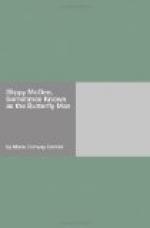Stripped all but bare, and with one servant left of all our staff, we turned our backs upon our old life, our old home, and faced the world anew, in a strange place where nothing was familiar, and where I who had begun so differently was destined to grow into what I have since become—just an old priest, with but small reputation outside of his few friends and poor working-folks. There! That is quite enough of me!
There was one pleasant feature of our new home that rejoiced me for my mother’s sake. From the very first she found neighbors who were friendly and charming. Now my mother, when we came to Appleboro, was still a beautiful woman, fair and rosy, with a profusion of blonde cendre curls just beginning to whiten, a sweet and arch face, and eyes of clearest hazel, valanced with jet. She had been perhaps the loveliest and most beloved woman of that proud and select circle which is composed of families descended from the old noblesse, the most exclusive circle of New Orleans society. And, as she said, nothing could change nor alter the fact that no matter what happened to us, we were still De Rances!
“Ah! And was it, then, a De Rance who had the holy Mother of God painted in a family picture, with a scroll issuing from her lips addressing him as ’My Cousin’?” I asked, slyly.
“If it was, nobody in the world had a better right!” said she stoutly.
Thus the serene and unquestioning faith of their estimate of themselves in the scheme of things, as evidenced by these Carolina folk around her, caused Madame De Rance neither surprise nor amusement. She understood. She shared many of their prejudices, and she of all women could appreciate a pride that was almost equal to her own. When they initiated her into the inevitable and inescapable Carolina game of Matching Grandfathers, she always had a Roland for their Oliver; and as they generally came back with an Oliver to match her Roland, all the players retired with equal honors and mutual respect. Every door in Appleboro at once opened wide to Madame De Rance. The difference in religion was obviated by the similarity of Family.
Fortunately, too, the Church and Parish House were not in the mill district itself, a place shoved aside, full of sordid hideousness, ribboned with railroad tracks, squalid with boarding-houses never free from the smell of bad cooking, sinister with pawnshops, miserable with depressingly ugly rows of small houses where the hands herded, and all of it darkened by the grim shadow of the great red brick mills themselves. Instead, our Church sits on a tree-shaded corner in the old town, and the roomy white-piazza’d Parish House is next door, embowered in the pleasantest of all gardens.




